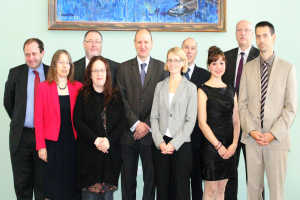University announces major collaboration for the development of new materials
27 Sep 2011
The University of Manchester and international chemical firm Solvay SA have announced a major collaboration to develop new materials for use in healthcare, sensors and as biocatalysts.

The new framework agreement builds on existing collaboration between the University and Solvay, based in Belgium, and represents a major milestone in open innovation for both organisations.
The agreement will accelerate new projects, involving lead academics from across several schools in the University’s Faculty of Engineering and Physical Sciences and represents a major investment by Solvay of more than £1.4m over four years.
Bernd Wilkes, Senior Executive Vice President of Solvay’s global business unit for Special Chemicals, said: “This ongoing collaboration with The University of Manchester and the new framework agreement signed today marks an important milestone in Solvay’s open innovation programme of research and development. The University of Manchester is one of our key partners in new organic materials for novel sensor and electronics applications.”
Major changes taking place in an aging population pose a number of challenges that will require new solutions, including new materials to replace worn out body parts. The collaboration will include new research projects to discover and develop novel biomaterials for use in regenerative medicine and the development of leading edge biocatalysts targeted at key life science processes.
Dr Aline Miller, Senior Lecturer in Biomolecular Engineering at The University of Manchester, said “I am very excited to be working in this interdisciplinary project and expanding our work with Solvay where we will work together to deliver fundamental enabling technologies into materials and taking them through to application in a variety of areas including regenerative medicine, sensors and electronics”.
The successful detection of low levels of analytes in a variety of media is often key to the diagnosis and management of processes. The ability to print electronics significantly reduces the cost of sensor production and has created an opportunity for ubiquitous sensing of the world around us. The Manchester-Solvay collaboration will drive the development of new materials and sensors for application in environmental monitoring, homeland security and healthcare.
Professor Michael Turner, Professor of Materials Chemistry, said “Working in collaboration with Solvay we are developing new materials and devices for application as low cost sensor systems that can monitor environmental contaminants and biomarkers of disease. It is a fantastic opportunity to take our research from the bench into commercial products with Solvay.”
Johannes Eicher, R&D Director of the global business unit for Special Chemicals said, “Our business unit is committed to innovating at the leading edge of research and technology with the best academic and business partners we can collaborate with. Our long term association with The University of Manchester, with the research teams covered by this agreement but also with the Organic Materials Innovation Centre and the Knowledge Centre for Materials Chemistry recognises their world class capability.
